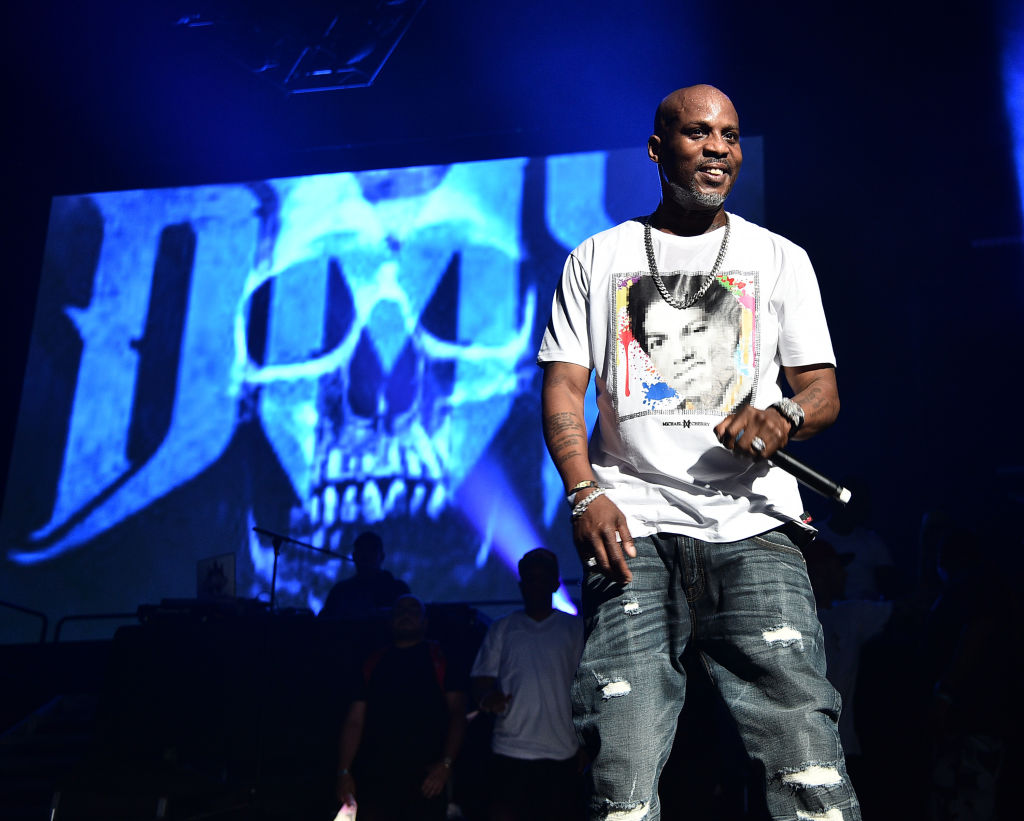
"I'm not the person the media portrays me to be," platinum rapper DMX says. “X is the bad guy. That’s not who I am. I’m not that person you see on TV."
The 50-year-old Earl Simmons, better known as DMX (which stand for "Dark Man X"), turned to Dr. Phil. DMX has opened up about his dark past and personal struggles. During the interview, he revealed that he suffers from bipolar disorder, which causes severe mood swings between mania and depression. The troubled star also discussed his battle to beat drug addiction and his history with dog fighting.
Despite all of his numerous arrests and now welcoming his 15th child into this world, DMX says he's destined to be a preacher.
"That's where I can't give you an answer-will I have more influence as a pastor or a rap artist?" DMX previously said in a radio interview. "But I do believe that God allowed my music career to create the platform to lay the foundation to gain the ear, to gain the credibility, so that way when I do become a pastor, I don't think I'm going to lose fans, I think I'm going to gain more."
Now he's preaching.
DMX has also taken to social media to share the good news of the Bible. The rapper took to Instagram Live and hosted a virtual Bible study. The only notice he gave was a very vague video announcement earlier that day where he said he had “something personal to share.” Many wondered if it was bad news since a lot of us only know the DMX whose very public battle with substance abuse, domestic disputes, dogfighting, and numerous run-ins with police were on display constantly in the news.
But during DMX’s Friday live session on Instagram, he went through scriptures in the bible in hopes to share God’s good news and help people deal with the uncertain times of this coronavirus pandemic. One particular piece of his bible study X was going through the book of Ecclesiastes 3. It was during this section that he spoke about “a time being for everything” happening right now, even social distancing.
A number of fans who were viewing the live commented on how sober, clean and clear the rapper looked while speaking. It’s something many fans haven’t seen in awhile. I must admit, X seemed authentic and real without being over-the-top or preachy.
"I say miracles only happen on the platform of tragedy. If there's not a difficult situation, if there's not a situation where you can't see you possibly getting through on your own then where's the potential for the miracle?
"If it wasn't that difficult than it would be just another situation that you got through with a little bit of time, but because it was something bigger than you, something that you know took more than you to get you through; It's not that God made these things happen but what I'm saying is that He allowed those things to happen, just so you know what He's willing to do for you."
But it was on June 28, 2016 that DMX went back on the nationally-syndicated radio show, The Breakfast Club and shared some of his "method of madness" and even shared a powerful prayer.
READ: What's The Difference Between Bipolar Disorder & Depression?
“I used to be really clear on who was what and what characteristics each personality had. But I don’t know at this point. I’m not even sure there is a difference,” he continued. “I'm Earl when I'm with my children. I miss my children, I miss my children, I miss my children."
DMX, whose struggles with substance abuse have been documented for a long time, says that he’s trying to get clean and is taking it in stride.
“Every day, I start my day off with a prayer to ask the Lord to guide my steps. Cover me and keep me safe. Every album, there’s a gospel song and a prayer. Every album, from the beginning.”
What many may not know is that DMX has been ordained as a Deacon at a Christian ministry in New York State before 2009 and has preached before!
“I read the whole bible. I just been made a deacon at the church I used to go to—Morning Star. I would like my first sermon to be there or in Yonkers.”
DMX, interestingly, muses about what it means to be ready for true transformation and realizes that reading the Bible is not enough.
“The biggest step is not in the studying, reading, but the wanting to change the way you live. Wanting different things for yourself, and making that change because if you still want to drink and smoke, you could read as much as you want, that doesn’t mean you’re ready.”
Despite multiple jail stints and highly publicized turmoil in his life, the rapper maintains that he desires to serve the Lord, eventually retire from music, and settle down as a preacher.
As difficult as it is for the media to discern between Earl Simmons and DMX, the rapper has similar issues on a personal level and says that he’s not even sure that there is a difference sometimes: “I used to be really clear on who was what and what characteristics each personality had. But I don’t know at this point. I’m not even sure there is a difference. I’m Earl when I’m with my children. I miss my children, I miss my children, I miss my children.”
Bipolar disorder, formerly known as manic depression, can mean wild mood swings and extreme shifts in energy, which can make it difficult to get things done every day. Patients who live with the disorder often have a hard time maintaining stability, especially when interacting with other people. They may have explosive outbursts of...
...temper that are unpredictable followed by deep depression characterized by hopelessness and despair.
It’s not uncommon among those living with mental illness to also struggle with drug addiction. Many dealing with depression, bipolar disorder, schizophrenia and other significant illnesses will often attempt to medicate the symptoms with drugs and alcohol, ultimately developing an addiction as a result. Dual Diagnosis treatment is often the only way to get help for both disorders at the same time.
His faith is something that DMX also struggles with.
For now, DMX is working on staying clean and sober in addition to getting the help he needs for bipolar disorder – “one day at a time” is his motto and spirituality is his guide: “I ask God to guide my steps. Cover me and keep me safe..”
“There will never be another me, never," he said. "To this day, I have records that have yet to be broken."
The Rare Disorder African Americans Living With Schizophrenia Or Bipolar Disorder Should Know About
 For people living with chronic mental illness, like bipolar disorder or schizophrenia, treatment using antipsychotic medications can not only help them manage day-to-day but can also be life-saving. However, use of antipsychotic medications, especially long term, can potentially lead to developing a rare neurological disorder called tardive dyskinesia (TD).
For people living with chronic mental illness, like bipolar disorder or schizophrenia, treatment using antipsychotic medications can not only help them manage day-to-day but can also be life-saving. However, use of antipsychotic medications, especially long term, can potentially lead to developing a rare neurological disorder called tardive dyskinesia (TD).
If you or a loved one is undergoing or considering antipsychotic treatment, here is what you should know about this disorder.
What is tardive dsykinesia?
According to the National Alliance on Mental Illness (NAMI), tardive dsykinesia is, "a movement disorder that may develop months, years and even decades after taking antipsychotic medication." The condition is estimated to affect 10 to 20 percent of people treated with antipsychotic medications, according to Mental Health America.
Antipsychotic medications block dopamine receptors and as a result decrease the amount of dopamine in the body. Dopamine, a chemical in the brain, is responsible for movement coordination.
Steven Garlow, MD, PhD, explained, “It seems like people with bipolar disorder may be more sensitive to the dyskinetic [abnormal movement] properties of antipsychotic drugs than people with schizophrenia.”
Risk Factors
It's important to note that not everyone treated with antipsychotic medications will develop TD. In fact, research shows that the average risk of developing TD with ongoing treatment is between 30 and 50 percent. However, NAMI lists the following as common risk factors:
- Longer treatment with antipsychotic medications, particularly for people who have taken first generation antipsychotic medications (however, it has also been reported in people who have taken second generation antipsychotic medications)
- Older age of a person receiving these medications, specifically post-menopausal females
- Alcoholism or another substance abuse disorder
- Being female
- Being African American or Asian American
Symptoms
Tardive Dyskinesia is characterized by involuntary and repetitive movements. These include:
- Lip smacking
- Lip puckering and pursing
- Grimacing
- Sticking the tongue out
- Rapid eye blinking; rapid movements of the arms, legs and trunk
- In severe cases, swaying of the hips or pelvic thrusts; speech difficulties; respiratory issues
Diagnosis & Treatment
Other neurological conditions, like Parksinson's disease, stroke and Huntington's disease are also characterized by uncontrollable body movements. Ongoing professional evaluation of those taking medications is necessary to properly diagnose TD. A standardized rating scale, "The Abnormal Involuntary Movement Scale," is used by most psychiatrists to screen for TD at least once annually.
There is not a specific medication that can cure TD. Prevention of TD is ideal, so speak with your doctor immediately if symptoms are present. If TD is confirmed, medication dosage may be decreased or patient may be switched to a different one.Other drugs such as benzodiazepines, adrenergic antagonists, and dopamine agonists may also help.
Supplements like...
...vitamin E and Gingko Biloba are also said to help, but more study is required to prove they can prevent or treat TD.
Resources
Living with TD can be challenging on several levels. For more information or support, look into the following organizations:
Tardive Dyskinesia/ Tardive Dystonia National Assoc.
P.O. Box 45732
Seattle, WA 98145-0732
Phone Number: (206) 522-3166
National Institute of Mental Health
Phone Number: 301-443-4513
Toll Free Number: 1-866-615-6464
Fax Number: 301-443-4279
Email Address: [email protected]
Website URL: www.nimh.nih.gov
National Org. for Rare Disorders (NORD)
P.O. Box 8923
New Fairfield, CT 06812-8923
Phone Number: (203) 746-6518
Toll-Free Number: (800) 999-6673
Website URL: www.rarediseases.org








